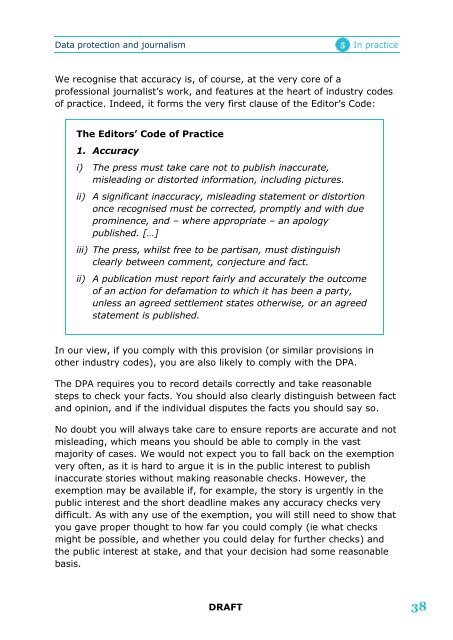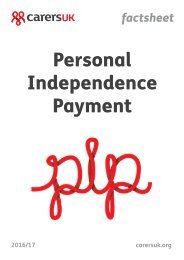data-protection-and-journalism-a-guide-for-the-media-draft
data-protection-and-journalism-a-guide-for-the-media-draft
data-protection-and-journalism-a-guide-for-the-media-draft
Create successful ePaper yourself
Turn your PDF publications into a flip-book with our unique Google optimized e-Paper software.
Data <strong>protection</strong> <strong>and</strong> <strong>journalism</strong><br />
In practice<br />
We recognise that accuracy is, of course, at <strong>the</strong> very core of a<br />
professional journalist’s work, <strong>and</strong> features at <strong>the</strong> heart of industry codes<br />
of practice. Indeed, it <strong>for</strong>ms <strong>the</strong> very first clause of <strong>the</strong> Editor’s Code:<br />
The Editors’ Code of Practice<br />
1. Accuracy<br />
i) The press must take care not to publish inaccurate,<br />
misleading or distorted in<strong>for</strong>mation, including pictures.<br />
ii) A significant inaccuracy, misleading statement or distortion<br />
once recognised must be corrected, promptly <strong>and</strong> with due<br />
prominence, <strong>and</strong> – where appropriate – an apology<br />
published. […]<br />
iii) The press, whilst free to be partisan, must distinguish<br />
clearly between comment, conjecture <strong>and</strong> fact.<br />
ii) A publication must report fairly <strong>and</strong> accurately <strong>the</strong> outcome<br />
of an action <strong>for</strong> defamation to which it has been a party,<br />
unless an agreed settlement states o<strong>the</strong>rwise, or an agreed<br />
statement is published.<br />
In our view, if you comply with this provision (or similar provisions in<br />
o<strong>the</strong>r industry codes), you are also likely to comply with <strong>the</strong> DPA.<br />
The DPA requires you to record details correctly <strong>and</strong> take reasonable<br />
steps to check your facts. You should also clearly distinguish between fact<br />
<strong>and</strong> opinion, <strong>and</strong> if <strong>the</strong> individual disputes <strong>the</strong> facts you should say so.<br />
No doubt you will always take care to ensure reports are accurate <strong>and</strong> not<br />
misleading, which means you should be able to comply in <strong>the</strong> vast<br />
majority of cases. We would not expect you to fall back on <strong>the</strong> exemption<br />
very often, as it is hard to argue it is in <strong>the</strong> public interest to publish<br />
inaccurate stories without making reasonable checks. However, <strong>the</strong><br />
exemption may be available if, <strong>for</strong> example, <strong>the</strong> story is urgently in <strong>the</strong><br />
public interest <strong>and</strong> <strong>the</strong> short deadline makes any accuracy checks very<br />
difficult. As with any use of <strong>the</strong> exemption, you will still need to show that<br />
you gave proper thought to how far you could comply (ie what checks<br />
might be possible, <strong>and</strong> whe<strong>the</strong>r you could delay <strong>for</strong> fur<strong>the</strong>r checks) <strong>and</strong><br />
<strong>the</strong> public interest at stake, <strong>and</strong> that your decision had some reasonable<br />
basis.<br />
DRAFT 38




